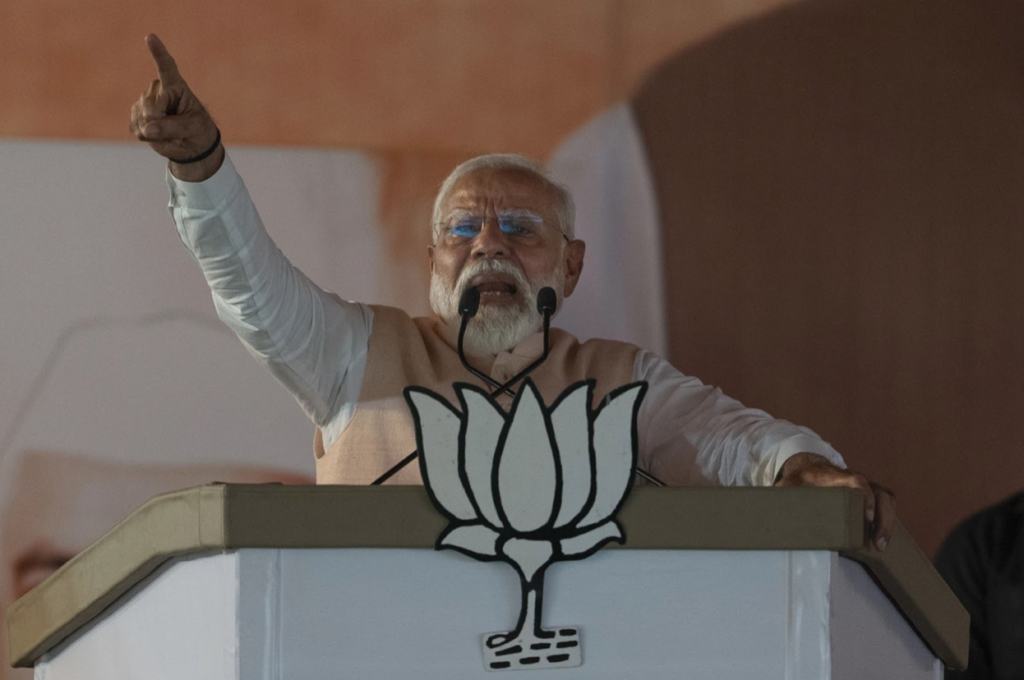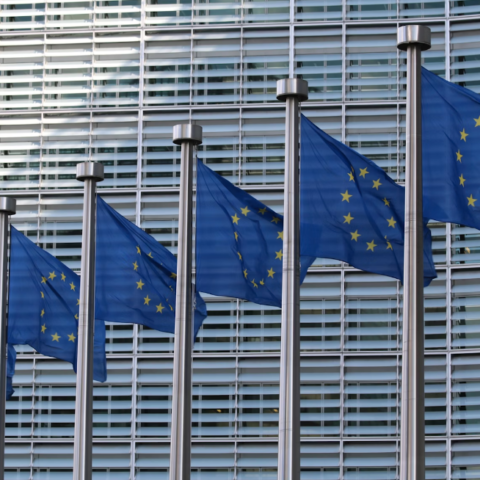By Zach Leggio and Mayerlyn Rivera
Edition 7: April 15-21

Upcoming
India
On Friday, April 19th, all 543 seats of the Lok Sabha parliament will begin statewide elections, which will elect the next prime minister. This election will bring over 900 million people to the polls, expected to be the most expensive in Indian history as millions of polling stations will be transported across the country. The election will take place over seven weeks, with the results being finalized on June 4th.
The current prime minister, Narendra Modi, was elected in 2014 and won his 2019 reelection by a landslide with his development and anti-corruption campaigns. Modi and his Bharatiya Janata Party have used Hindu nationalism to gain large public support in the predominantly Hindu northern states. The main rival to the BJP is the Indian National Developmental Inclusive Alliance, which is predominantly made up of the Indian National Congress, with the key goal of denying Modi a third term. The INC has claimed that the BJP attempted to suppress them, as their bank accounts were frozen last month.
The BJP is attempting to increase its support in southern India during this election cycle as it continues to grow its nationalistic rhetoric. Modi’s “Hindu-first” policies, such as renaming Muslim-named cities, demolishing Islamic monuments, and rewriting history books, have left Muslim Indians feeling like second class citizens. Under Modi’s government, civil liberties, such as the right to protest and freedom of speech, have been threatened.
Despite these issues of civil liberties, Modi’s BJP will likely maintain their majority, securing him a third term as prime minister. Modi is predicted to continue his foreign policy efforts of asserting India as a geopolitical competitor to the United States and China by better supporting the Pacific Island nations and the Indian Ocean countries. Domestically, Modi will likely continue to empower the Hindu majority and increase manufacturing as India has emerged as a direct competitor to China in the international economic production sector.
Ecuador
This upcoming Sunday, April 21st, Ecuadorians will have the opportunity to participate in a vote on constitutional changes proposed by President Daniel Noboa of Acción Democrática Nacional. These changes result from the newly elected President’s efforts to expand the country’s police and military power in an effort to dismantle gang groups he designates as terrorists. This referendum comes as an attempt to reform the constitution in an era where a growing conflict is emerging between government forces and criminal gangs. Two large gangs -the Choleros and the Lobos- collaborate with neighboring gangs in Mexico and Colombia for drug trafficking supply activities. They have been escalating their violent crimes as a result of a territory war, including decapitations, dismemberments, and attacks on journalists and politicians. There has been a large dissatisfaction with the enjoyment of social rights, leading to a mass movement of Ecuadorians towards the North.
In January 2024, President Noboa began mobilizing his efforts to strengthen security measures, and he declared a state of emergency later in the month due to a gang-related crime. A turning point for Noboa’s efforts came when a gunman entered a TV station and murdered a presidential candidate in January. The 11 topics that the citizens of Ecuador will vote on Sunday involve manners such as stricter gun laws in areas surrounding prisons and longer prison sentencing for organized crime offenses. The wake of the coronavirus is said to be a contributing factor to the rise of violent crimes committed, even within the prisons. Noboa is fighting for the intervention of armed forces against organized crime and the creation of a stronger justice system resulting in fair prison convictions. President Noboa’s efforts with this referendum allow the citizens of Ecuador to impose longer prison sentences for more serious crimes, such as homicide and arms trafficking. If the voter turnout is in favor of Noboa’s propositions, there will be a large movement of militarization in Ecuador to eradicate all organized crime groups from the state and allow for economic and social growth.
Croatia
This Wednesday, April 17th, all 151 Parliamentary seats in Croatia will be open, and with the majority or coalition of other parties, the next prime minister will be appointed. President Zoran Milanović announced the election shortly before declaring his candidacy for the position as a member of the Social Democratic Party. Despite it being unlawful for an acting president to be elected as prime minister, Milanović has dismissed this concern due to suspected corruption from current Prime Minister Andrej Plenković of the Croatian Democratic Union (HDZ). The HDZ has ruled 26 of 32 years since Croatia separated from former Yugoslavia, beginning as an ethno-nationalist Croatian party and evolving into a center-right wing Pro-European party.
The HDZ has been swamped with corruption scandals, which has produced concerns from left and right-wing groups. Milancović has voiced the concern of many left and right-wing groups on HDZ, and Plencović appointed Ivan Turdić as attorney general despite his ties to corrupt figures. This raises many concerns for the potential reelection of Plencović, because the prime minister is responsible for the national agenda and appoints Cabinet members. This year has been dubbed as a super-election year, with the presidential elections planned for the latter part of 2024. Although presidential powers are mainly ceremonial, they allow propositions for amendments and calls to parliament. The parliamentary seats that are open for election this week will be voted in by a majority, or coalition of other parties, to appoint the next prime minister. Polls reveal that the HDZ may take the majority of votes, but it is unclear what parties and candidates smaller groups will lean to support. If the rivaling far-right party, the Homeland Movement, gains support from left and center groups, it may impact the chances of the HDZ and Social Democrats securing the seat.
Solomon Islands
Solomon Islanders will soon head to the polls to elect the 50 members of the national legislature. Elections were originally slated for 2023, but Prime Minister Manasseh Sogavare delayed them until 2024, raising red flags within the international community. The Solomon Islands have a very weak party system, with parties being created and dissolved frequently between elections and many candidates running as independents. As a result, politicians must form coalitions to govern, with Sogavare leading the current ruling coalition and Matthew Wale leading the opposition coalition, the Coalition for Accountability Reform and Empowerment (CARE).
These elections are key to determining the foreign policy direction of the Solomon Islands. Under Sogavare’s rule, the Solomon Islands withdrew its recognition of Taiwan and signed a security pact with the People’s Republic of China, straining relations with the United States. Several candidates are campaigning to end the security pact with China, with some favoring closer ties with Australia and New Zealand, and others favoring strengthening relations with the US. The US has expressed concerns of increased cooperation between the Chinese military and police in the Solomon Islands, believing that this could lead to the establishment of a Chinese military base on the islands.
Overall, these elections are vital for the people of the Solomon Islands to express their views on the foreign policy direction of the country. The elections will also be a major test to the government’s ability to handle political change, regional divide, and corruption.
The Maldives
The Maldives will be holding legislative elections for their parliament, the Maldivian People’s Council. Currently, the Maldivian Democratic Party holds 65 out of 87 seats, but this is likely to decrease dramatically, as the party has been increasingly fractured since losing the 2023 presidential election. That election, which saw Mohamed Muizzu become president, cemented the People’s National Congress as a strong contender for these 2024 legislative elections. Muizzu’s presidency has seen a foreign policy shift towards China and away from India, with Muizzu asking all Indian soldiers to leave the Maldives.
This election, similar to that of the Solomon Islands, is an important time for the electorate to voice their opinions on foreign policy. The Pacific/Indian Ocean region is torn between China, the United States, and India, who all are vying for geopolitical influence in smaller island nations. Politicians in the Maldives are split on these regional allegiances, all while trying to fight the effects of climate change, which has already had perilous effects on the nation.
Recap
South Korea
South Korea held its legislative elections on April 10, resulting in a crushing defeat of incumbent-president Yoon Suk Yeol’s People Power Party. The PPP, which narrowly won the 2022 presidential election while holding a minority in the National Assembly, lost six seats, while the main opposition parties, the Democratic Party and the Rebuilding Korea Party, gained 19 and 11 seats, respectively. These parties campaigned against Yoon’s economic policies as president, which they claim have caused massive rises in food prices, using green onions as an electoral symbol.
Yoon is now left with an even more hostile legislature for his last three years as president, leaving him little room to carry out any domestic policies included in his campaign. He does still maintain power over foreign policy, which he has used to continue strengthening security deals with the United States and Japan.
Photo Credit: https://apnews.com/article/india-election-modi-bjp-democracy-8998fe6aba5fa26debc0f82c4e2ccf69

